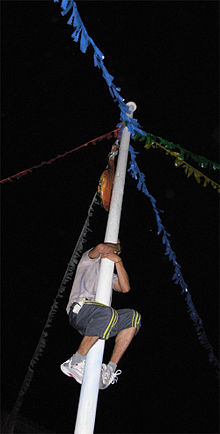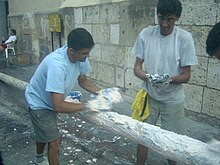| Revision as of 01:09, 24 June 2018 editStrayBolt (talk | contribs)Extended confirmed users5,305 edits →top: added metaphorTag: 2017 wikitext editor← Previous edit | Revision as of 01:16, 24 June 2018 edit undoAmorymeltzer (talk | contribs)Autopatrolled, Interface administrators, Oversighters, Administrators63,405 edits AFD closed as keep (XFDcloser)Next edit → | ||
| Line 1: | Line 1: | ||
| <!-- Please do not remove or change this AfD message until the discussion has been closed. --> | |||
| {{Article for deletion/dated|page=Greasy pole|timestamp=20180609070639|year=2018|month=June|day=9|substed=yes|help=off}} | |||
| <!-- Once discussion is closed, please place on talk page: {{Old AfD multi|page=Greasy pole|date=9 June 2018|result='''keep'''}} --> | |||
| {{refimprove|date=June 2018}} | |||
| {{original research|date=June 2018}} | |||
| {{essay|date=June 2018}} | |||
| <!-- End of AfD message, feel free to edit beyond this point --> | |||
| {{Use dmy dates|date=March 2017}} | {{Use dmy dates|date=March 2017}} | ||
| {{For|the ''Yes Minister'' episode|The Greasy Pole}} | {{For|the ''Yes Minister'' episode|The Greasy Pole}} | ||
Revision as of 01:16, 24 June 2018
For the Yes Minister episode, see The Greasy Pole. For the Francisco Goya painting, see La cucaña. Not to be confused with Maypole.
Greasy pole, grease pole or greased pole refers to a tall pole that has been made slippery and thus difficult to grip. More specifically, it is the name of several events that involve staying on, climbing up, walking over or otherwise traversing such a pole. This kind of event exists in several variations around the world. It is also used as a metaphor for the difficulty in achieving the top of your career.

Canada
As part of Queen's Engineering Frosh Week, the incoming first year engineering students must, with the help of the upper-year engineering students, climb to the top of a grease pole and remove a tam which is nailed to the pole's top. The Queen's Grease Pole is a metal football goalpost stolen by Queen's engineering students in 1955 from University of Toronto's Varsity Stadium. Currently, the pole is covered in lanolin and placed in the centre of a pit of muddy water referred to as the "Grease Pit", but from the first climbing of the pole in 1956 to 1988 the pole was covered in axle grease and it was only sometime between 1957 and 1967 that the pit was added to the event. There have been various other changes to the rules of the event since its inception, including the banning of the throwing of projectiles at the frosh attempting to climb the pole by upper years, removing unsanitary contents from the pit and allowing women to participate.
As of 14 September 2015, the Grease Pole resides somewhere in the University of Toronto after the Brute Force Committee (the engineering pranking club) was able to steal the Pole from the Queen's freshmen welcome events. The Grease Pole was returned to Queen's via a transfer to MacMaster University in June 2016 and was subsequently used in Queen's Engineering Frosh Week 2016.
The Bear River Cherry Carnival in Bear River, Nova Scotia offers $100 every year to the first person to walk out their greased pole and grab a Canada flag nailed to the end of the pole. The greased pole is held at a different time every year as they have to schedule it for high tide so there will be water below the pole for competitors to fall into. After the first round, competitors have to make it over the second red ribbon to continue on. Competitors must fall 'clean'. That is, competitors who grab the pole when falling are immediately disqualified. David Isles of Bear River added his fourth win on July 13, 2013.
Malta

The city of St. Julian's holds a yearly il-ġostra, the greasy pole game. Dating back to the Middle Ages, ġostra, which is derived from the Neopolitan cuccagna, is played in late-August during the Feast of St. Julian. For the greasy pole game, a 65 foot wooden beam is attached to a pier (it has been attached to boats in the past) at an angle and extended over the sea. Flags are attached to the pole, which is then greased. The aim of the game is to run to the end of the pole and grab a flag.
United Kingdom
In the UK, contests to climb a greasy pole were held at numerous fairs including the Crab Fair in Egremont, Cumbria where the contest continues to this day – alongside the annual Gurning World Championships see Gurn. The prize for climbing the 30-foot-long (9 m) pole was originally a hat but from 1852 became a side of mutton – which if there are no winners is cut up and distributed to the poor. Since 2004 the greasy pole has been discontinued as an event at Egremont Crab Fair, due to high insurance cover costs, should a participant fall from the pole.
As of 19 January 2008 Egremont is the proud home of the new Greasy Pole. A 30-foot-long (9 m) sculpture by Turner Prize winning artist Jeremy Deller and collaborator Alan Kane. This is the team's first piece of public art and marks the re-introduction of the Greasy Pole as a crab fair event.
The phrase 'to climb the greasy pole' means reaching the upper echelons of any hierarchy but usually refers to politics.
A slight variation is provided at the annual Seaview Regatta on the Isle of Wight. Here the greasy pole is horizontal over the sea and competitors walk along it, the one who walks the furthest before falling into the sea is the winner.
Blakeney in North Norfolk also has a horizontal pole over water that is erected each year for the Blakeney regatta. The event dates back to 1873 and the prize for winning in the early days was a hog. The object is to reach the end by walking along the heavily greased pole, although in recent years sliding has become the preferred method. Blakeney regatta also includes sailing, swimming, and tug of war across the creek.
United States
Gloucester, Massachusetts

The Greasy Pole Contest takes place every year during St. Peter's Fiesta in Gloucester, Massachusetts. During this time, many young men try their luck at walking down a greased, wooden pole in the middle of Gloucester Harbor. The goal is to be the first person to grab the red flag at the end of the pole.
Other regions

Southern Europe - In Spain, the game of climbing the pole is known as a cucaña. In Italy it is called albero della cuccagna.
Netherlands - In The Netherlands it is called sprietlopen.
South East Asia - The game has been introduced into other countries by European colonists. In Indonesia, the game is thought to have introduced by the Dutch and is called Pangjat Pinang where young men climb up a greased pole to collect prizes. In the Philippines, the traditional Philippine fiesta game of Palo-sebo is derived from the Spanish cucaña.
Zogam - In Chin State, Burma, Mizoram, Manipur of India and Chittagong Hill Tract of Bangladesh, the game of climbing the pole is known as a Sukpum thaltawh is played during the Zomi feast. It is one of the indigenous games of Zomi.
References
- "Greasy History". Engsoc.queensu.ca. 8 October 1955. Retrieved 11 September 2010.
- "Detailed Events". Engsoc.queensu.ca. 21 September 1976. Retrieved 11 September 2010.
- http://www.mariosbakery.ca/bfc/images/press/queensrelease.pdf
- Riley, Jonathan. "David Isles takes fourth flag at Cherry Carnival greased pole". Digby County Courier. Transcontinental Media. Retrieved 15 July 2013.
- Badger, George Percy (1838). Description of Malta and Gozo. M. Weiss. p. 106—107.
- Ltd, Allied Newspapers. "A greasy pole and gunfire mark St Julian's feast". Times of Malta. Retrieved 18 June 2018.
- Rebecca Younger (26 August 2013). "Runners attempt to climb 65ft greasy pole during bizarre Maltese religious festival tradition". The Mirror.
- Baker, Billy (2 July 2017). "GREASE and GLORY". The Boston Globe. Retrieved 3 July 2017.
- "NK Sprietlopen". RTV Rijnmond. 8 August 2010. Retrieved 3 March 2013.
- "Panjat Pinang – A Slippery Tradition of Indonesia". 3 September 2015.
See also
External links
- St. Peter's Fiesta: Official Website
- Crab Fair Official Web Site
- Greasy Pole Documentary
- Hot Docs Canadian Film Festival Official Web Site